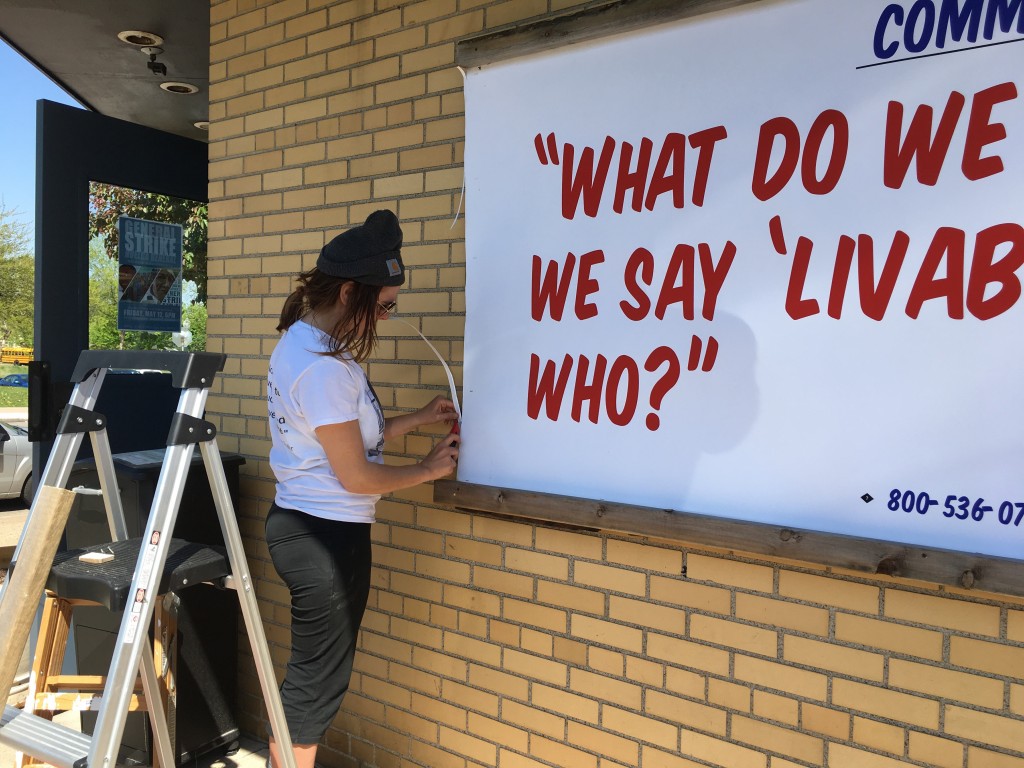
Rachel at work.

Rachel at work.
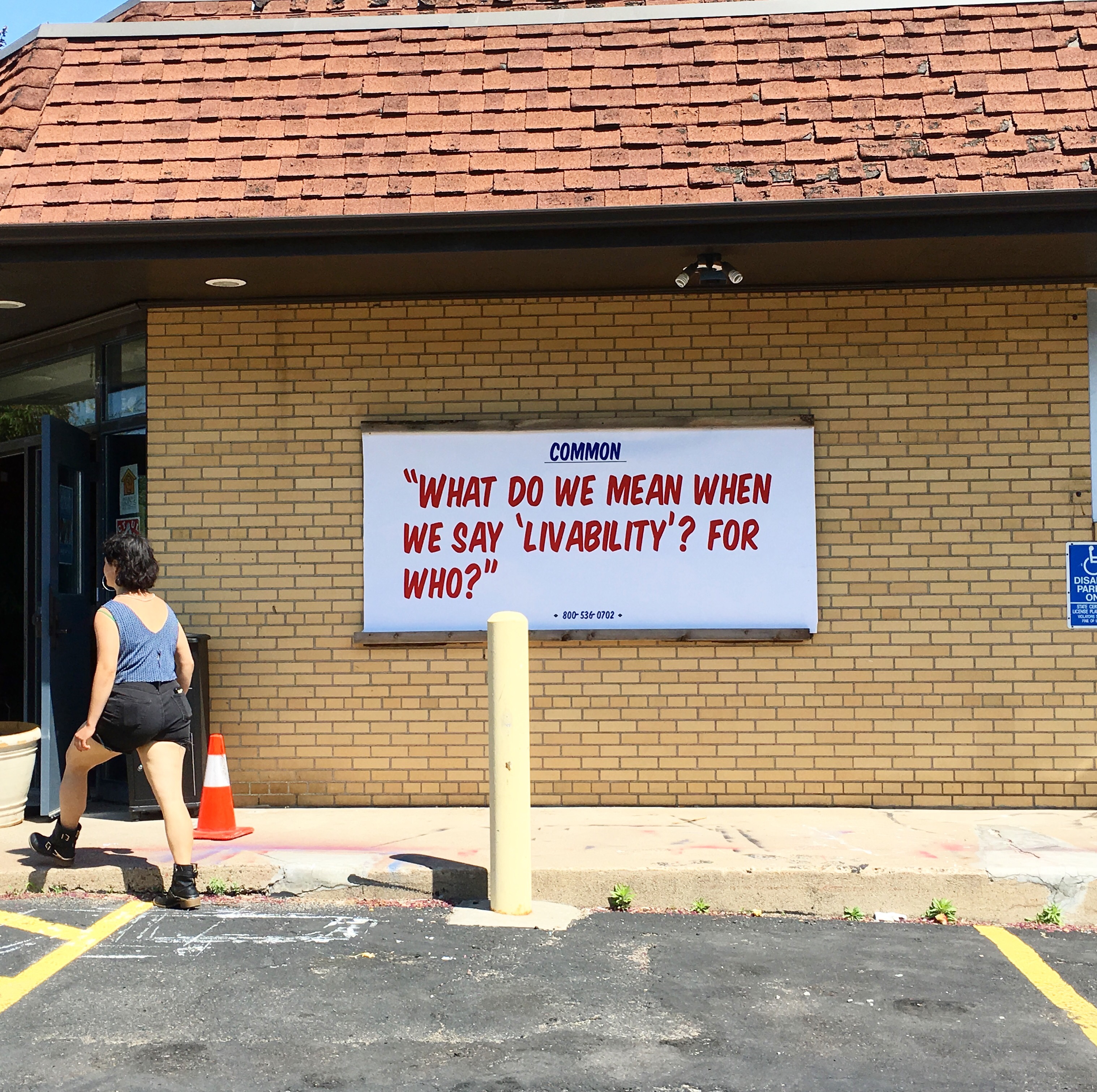 The first billboard for this new project, Public Comment, coming out of the shop that Sam and Jonathan Herrera are working on went up outside of the offices of Centro de Trabajadores Unidos en la Lucha (CTUL) and CANDO, the Central neighborhood organization. The goal is to gather common, if not always complimentary in association, questions from around the neighborhood and to distill these gathered questions into a series of uniformly designed billboards, translated into the predominant languages spoken in the neighborhood. If you live in the Powderhorn, Central, or E. Philips neighborhoods of the 9th Ward and have a broad question concerning how we live with one another or might possibly in the future, call the Public Comment hotline and leave us a message: 1.800.536.0702 (special thanks to Aaron Johnson Ortiz at CTUL for the invitation to house the first billboard and to Rachel Hiltsley for her labor and insight into the project and its future). Also, if you are a commercial or residential property owner in the neighborhood and would like to host a billboard please get in touch. We’d love to collaborate with you as the project moves forward.
The first billboard for this new project, Public Comment, coming out of the shop that Sam and Jonathan Herrera are working on went up outside of the offices of Centro de Trabajadores Unidos en la Lucha (CTUL) and CANDO, the Central neighborhood organization. The goal is to gather common, if not always complimentary in association, questions from around the neighborhood and to distill these gathered questions into a series of uniformly designed billboards, translated into the predominant languages spoken in the neighborhood. If you live in the Powderhorn, Central, or E. Philips neighborhoods of the 9th Ward and have a broad question concerning how we live with one another or might possibly in the future, call the Public Comment hotline and leave us a message: 1.800.536.0702 (special thanks to Aaron Johnson Ortiz at CTUL for the invitation to house the first billboard and to Rachel Hiltsley for her labor and insight into the project and its future). Also, if you are a commercial or residential property owner in the neighborhood and would like to host a billboard please get in touch. We’d love to collaborate with you as the project moves forward.
Lunch Buddies…
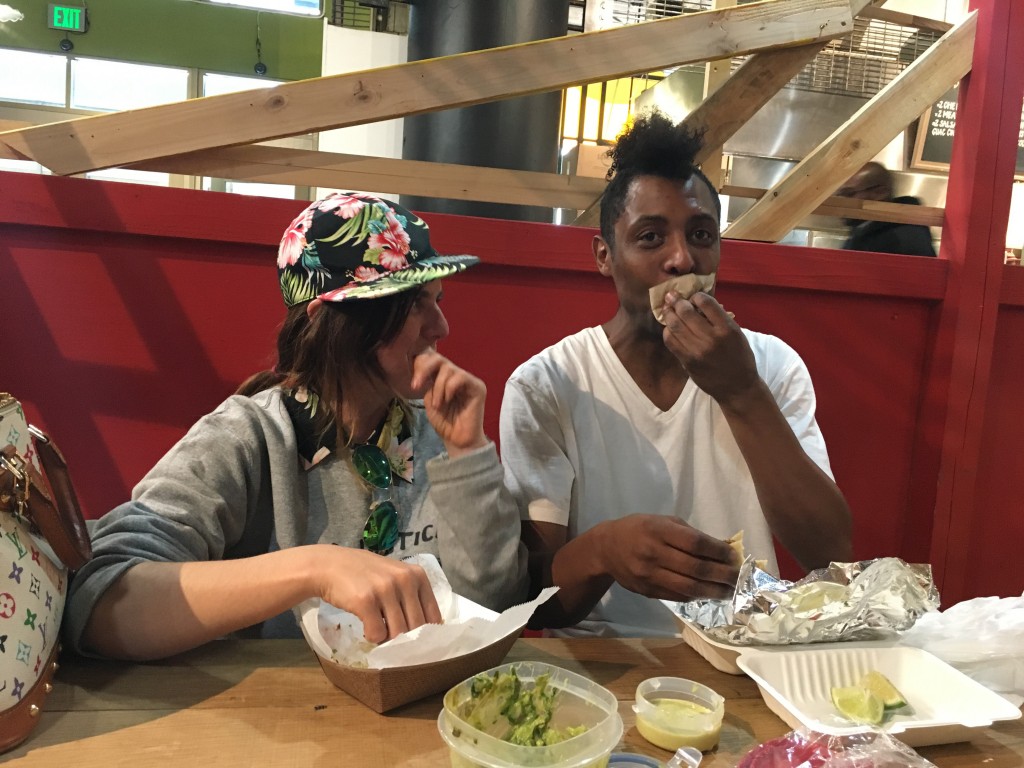
(http://municipalrecipes.cc/)
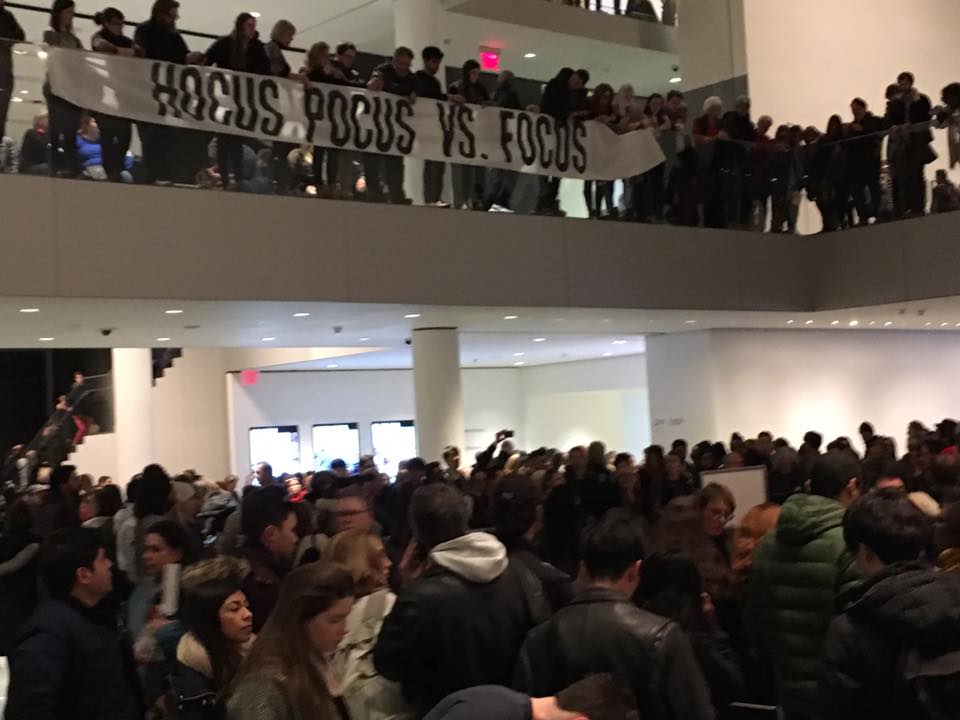
Hocus Pocus Vs. Focus – a Labor Camp banner in collaboration with Sam Gould and Seth Kim Cohen.
The kids are off from school today. We opened up the shop much to their excitement as they were ready to sell more of their drawings to the nurses and other workers from Alina. They have a rare capitalist gene I do not possess.
Just after opening, Mostafa – who runs a shop on the other side of the market – came in to make some copies. I was playing Nass el Ghiwane, much to his delight. “This is music from Morocco. Revolutionary music!” I could tell this was a rare time he’d heard his home country’s music in Minneapolis, let along music like Nass el Ghiwane. I told him how I liked them, but only knew a little bit about their history. I mentioned how I knew they were a very political group. “Yes,” he said, “they are people’s music. They risked very much, and even went to jail.”
We spoke of Morocco, and his family’s city, Fes, a place I have always wanted to visit. Louis gave him a Pokeman drawing.
All yet another reason why I love spending my days at the shop, and how much that love is energized, in good part, by everyone here at the Global Market.
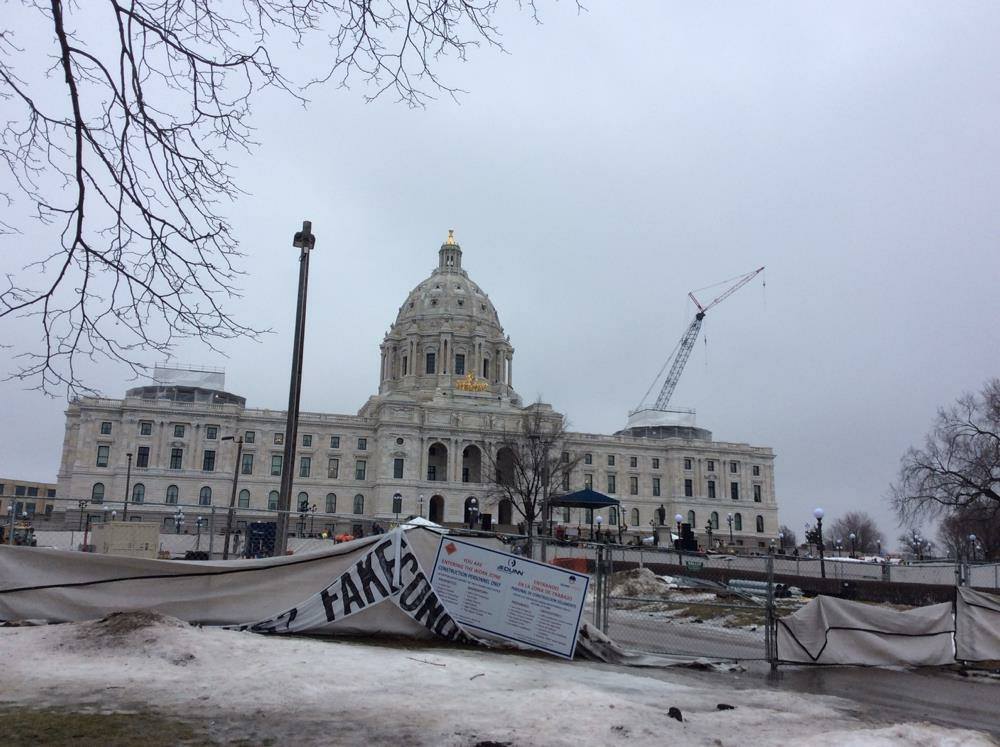
Yesterday and today the shop has been closed. We’ve been out in the streets with our friends and our neighbors, voicing our anger, our commitment, desire, rage, and love in this moment.
With the help of Labor Camp we made a gigantic banner, as wide as the street itself, that Sam and Derek carried with Sam’s kids from Lake & Nicolette all the way down to City Hall. Together with thousands of others, it was a cathartic and beautiful collision of unique experience and shared purpose.
Today we made our way to the Minnesota state capitol for the Women’s March, joining over 100,000 others expressing our support for women’s rights in the fight against misogyny and systemic sexualized violence against women.
Many doors to a more inclusive and progressive future are wide open today. Our challenge? Keeps those doors open for as long as it takes to bust the hinges off.
This will take more than marches and more than slogans. It will mean not asking for permission to takes the streets. It will mean speaking up and acting out in our places of work and education. It will take confronting difficult issues at home with loved ones, and in our relationships with friends alike. It will take – each and every one of us – being active, energized, and out front each and every day. In all our moments, not simply the ones we see as “political.” It will take the recognition that politics is, simply, power and how it operates. And power exists between individuals, their relationships, their institutions. It takes our shining a light on that power – ours and the power (or lack thereof) of others – and pushing that power towards what is right…
It will require an America identity that sets a true example for the world about how to treat other humans and the planet we share. But what more? Putting gender, race, class, sexual orientation, nationality aside it might serve us more so to get down to what we can agree on when we think about being “human.”
At the moment this human thing, at least as regards the way we’re engaging it now, isn’t doing us too much good and we are quite literally sketching out our own extinction. Rather than jockeying for positions of power, what if we began to consider what is best for all of us and not just some of us? What if we began to think small as a path towards thinking big; looking directly in front of us rather than squinting into the distance and inevitably distorting what lies right in front of our face? What’s closest to you? What is it connected to, and you in turn it? After a while we begin to understand the network, and radically, deeply personally, comprehend our value as a node within it.
Sunday’s Anarchy is Female workshop felt like exactly where we needed to be. A large group of people arrive at the shop ready to get to work; to plan and organize together, to imagine ways of being, acting, resisting, and re-imagining the world outside of, and in resplendent antagonism towards, the specter of patriarchy.
Many flags were hand-drawn and matchbooks stamped. Variations on the Anarchy is Female logo were printed. 200 were produced and handed out, many of these being delivered to Washington D.C. for the inauguration, and others staying here for various actions.
As the day ran on Crystal and Sam both thought the gathering shouldn’t simply occur just once. After the Inauguration we’ll re-group and plan on future, possibly monthly, Anarchy is Female gatherings. Stay tuned.
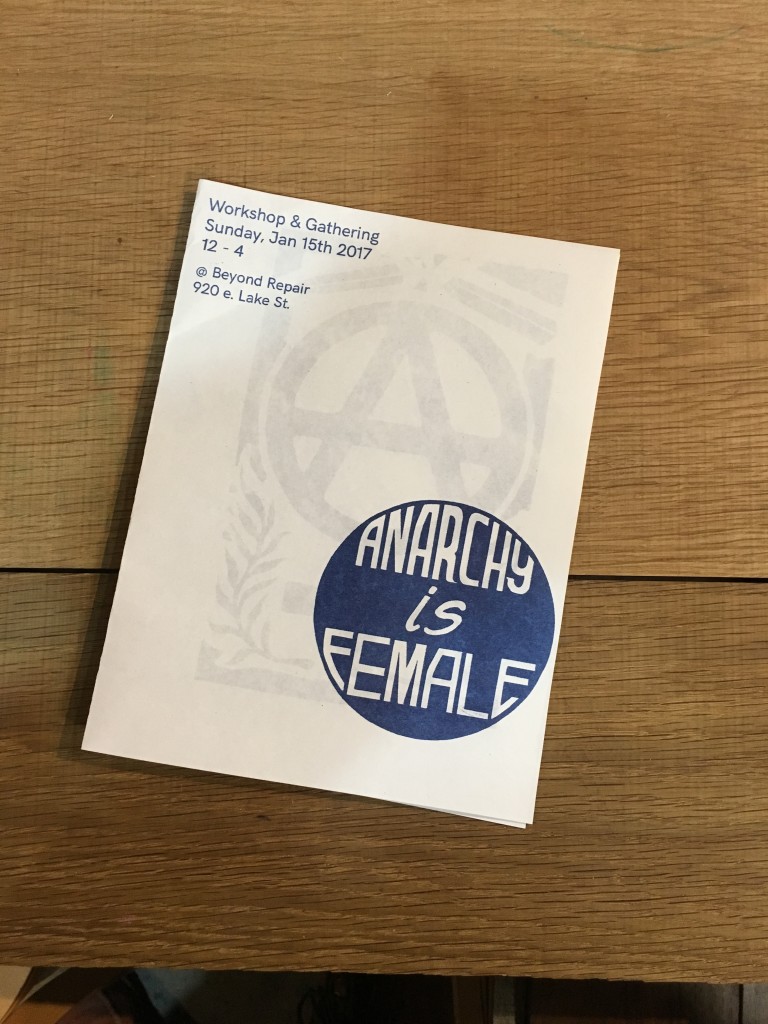
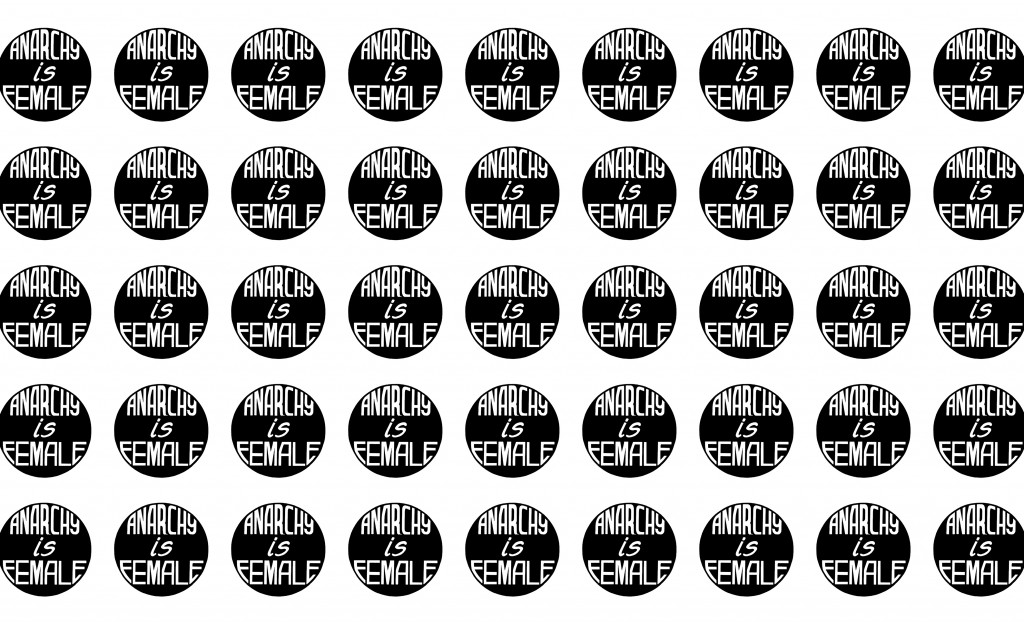
Organized by: Crystal Quinn, Alexa Horochowski, & Beyond Repair
Based on inherent feeling towards what is and what exists around us, the battle against this patriarchal culture, is inherently female.
Around the rallying cry “Anarchy is Female” all are invited to come together for a printing event and skill / knowledge / experience share. Throughout the day we will be printing multiple different Anarchy is Female designs to be used for the inauguration protests within the city and throughout the US, including the Million Women’s March in D.C.
Furthermore…
Matchbook Club:
As a quick reaction to the recent electoral let down, a group of female artists have come together to create. Started out as a “book club”, they quickly shifted into a loving and creative space to discuss and create. For this event, the Matchbook Club will have matchbooks for take-away, as well as a handful of posters that respond to harassment in a non-violent way. Words are our friends. We have to start somewhere and we have to keep moving.
Make Flag / Burn Flag:
Many citizens are feeling disillusionment, anger, and frustration after an ugly election where expressions of xenophobia, racism and misogyny flared and threaten to become normalized. Burning a flag is considered “symbolic speech” and protected by the First Amendment of the United States Constitution. In conjunction with the exhibition “BLEED & BURN ” Alexa Horochowski invites participants to make their own, small flags with personalized statements, to be burned independently.
The Exhibition, “BLEED & BURN,” is on view at The Soap Factory, January 14-21, 2017.
——————-
All are invited to utilize the space in and around Beyond Repair to consider and convene their ideas on creative resistance to misogyny and patriarchy.
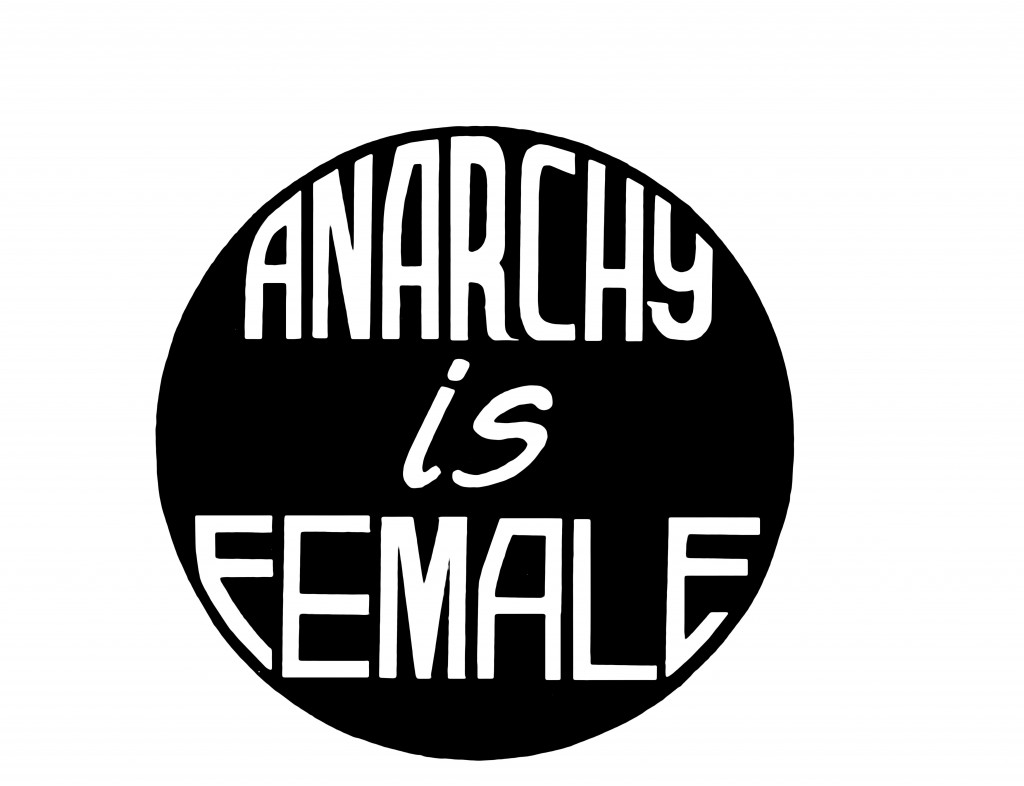
Anarchy is Female workshop, skill-share, printed extravaganza for radical female empowerment and care on Jan. 15 at the shop.
Details coming soon.
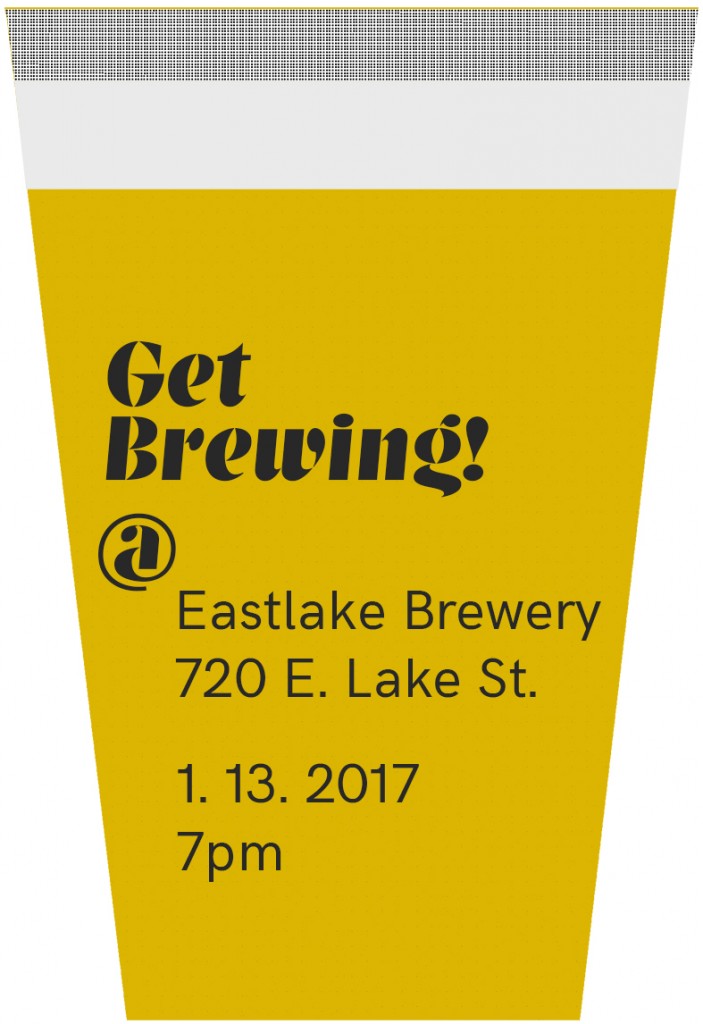
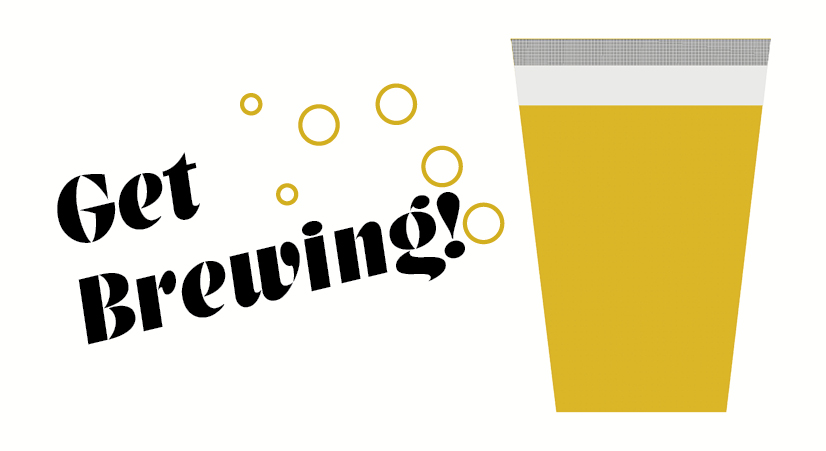
Join us on Jan. 13th at the brewery. Tell your friends. Drink some delicious beer. Propose a project. Win some money. Do some good with it. Come back next time and tell us what’s what.
__________________________
Get Brewing! : A Micro Funding/Brewing Platform Supporting Neighborhood Creative Engagement for Defense and Wellness in South Minneapolis
__________________________
Beyond Repair and Eastlake Craft Brewing have devised a micro-grant presentation platform – Get Brewing! – established to promote and support creative social engagement around defense and wellness in the 9th Ward neighborhoods of Powderhorn, Central, and Phillips. Modeled after FEAST (“a recurring public dinner designed to use community-driven financial support to democratically” fund project proposals) Get Brewing! invites 9th Ward neighbors to individually or collaboratively propose projects that imaginatively address how we, as neighbors, can care for, assist, and protect one another within this moment of unease.
Every other Friday at 7pm, starting January 13th, drop by Eastlake for a beer. Propose a project, or simply listen in on the great ideas of your fellow neighbors. Proposals will be voted on by all in attendance. With $2 from every full-size beer sold to participants that evening going into the Get Brewing! fund, the winner walks away with that night’s profits to help support the realization of their idea. Winners return at the next gathering of Get Brewing! to share what they’ve done.
Within a moment where distrust and fear, hate crimes, and general unease are at a fever pitch, models and actions that address how we care for one another, as well as ourselves, are not simply a good idea, but vital social tools for mental health and personal freedom in advance of crisis. Get Brewing! creates a social space to critically address these concerns and highlight methods of support for one another from the ground up. With communal intent we, as neighbors, can energize ideas that benefit us all, starting with our neighbors most at risk within a climate of heightened aggression and intolerance.
Have a beer!
Come up with an idea!
Commit to one another!
Repeat as necessary!!
“I’m incredibly excited to make this news public. Last week I was awarded a Mid-Career Project Grant funded by the McKnight Foundation and administered through Forecast Public Art. I am overwhelmed and overjoyed by this support and its implications for the work and energy that is being generated out of the relationships forming in Beyond Repair. With this support (along with last weeks wonderful news of a Visual Arts Fund grant through the Warhol Foundation and Midway Contemporary Art Library) we’ll be able to do so much; bring in new voices with vital stories to tell, create platforms to amplify voices already present in the 9th Ward, and support the production of creative engagement throughout the neighborhood for some time to come.
The grant will support Publics & Publication. A multi-faceted project that will gather histories known and not-known-well-enough from noted artists, activists, and thinkers who have activated ideas around publication (the act of public making) to energetic means. These histories will energize a series of public projects and platforms (such as printed publications, radio broadcasts, and interactive billboards) addressing policing and “security” within Minneapolis’ 9th Ward, as well as models for collective self-defense and wellness.
What this will all look like will come out of the interactions that we share together within the shop. But, for starters, two platforms for continued questioning, and amplification of those questions, will be developed: a radio station (W R/L F/R, which stands for With Radical Love and Fierce Resistance, the thematic for all programming) and an on-going series of free pamphlets engaging urgent topics, advice, and tools around our present moment of abject fuckery that is Trump-World.
It’s incredibly important for me to thank all the people who have offered their time and love to the shop this first year. Random droppers-by who have become fast friends and compatriots like Duaba (Dane) Verrtah; the ever-expanding, soon to reform in some fashion, folks of the Undercommons Reading Group; Fiona Avocado, Derek Winston Maxwell,Lacey Prpić Hedtke, Rachel Hiltsley and all those who decided that they wanted to spend time around the shop and bring others into the fold (along with, simply, giving me a moment to breath and / or hang out with my family). Oh man… there are so many people!! You know who you are. And I will thank you personally.
There’s more to add, and so much more to come. I’ll be sure to clue you in when things are afoot. But for now, thank you thank you thank you. I am so grateful and excited for what will and may come out of this level of support for a project that, I am well aware, is complex and not in the least spectacular. And I mean that in a good way.
In closing, I wanted to point out one thing. I’m really not a fan of competition. And in this circumstance that is exactly what I got myself into. There were five finalists for this award. One of them being Roger Cummings, an artist and friend who I have a lot of respect for. I was certain Roger would get this. But that’s not how it turned out. Along with a whiskey, I want to extend my thanks and gratitude to Roger (and DeAnna!) for all the amazing work they do in Minneapolis, and the thousands of young minds and souls they have energized over the years. Here’s a future devoid of competition, bursting with shared support and friendship.” – Sam
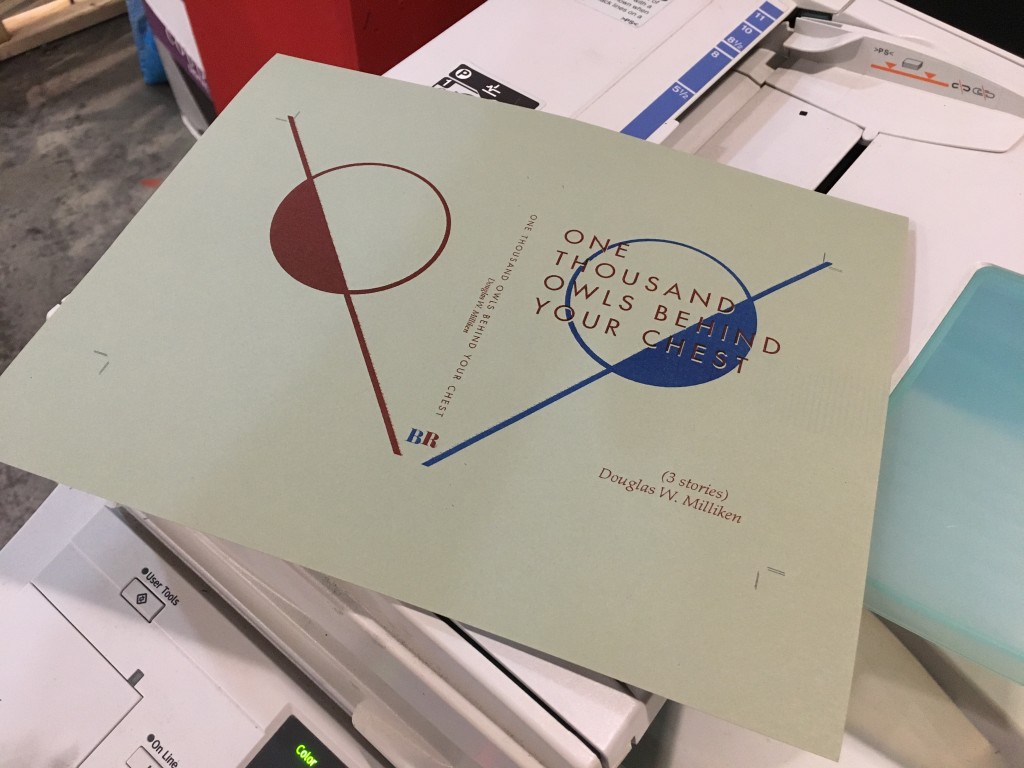
Just finished the covers for Doug Milliken’s One Thousand Owls Behind Your Chest. Our good friends over at Publication Studio – Hudson (which paradoxically now happens to reside in Troy, NY) will be handling the interiors and hand-delivering the finished books to the release at SPACE Gallery in Portland, ME on Dec. 15th. And we’ll have copies here at the shop as well.
Crisis brings out the best in us. Unlike personal hardship, crisis, as we’ll be speaking about through Crisis Logic & the Reader, is collective. We may not all agree on goals, or tactics, but we are all in it, living a complex association of subjective realities experienced, within crisis, more on the surface than we normally allow for. The social disruption experienced within crisis is raw, vulnerable, and most importantly, it is highly malleable. It is shaped by our engagement and our proximity to one another.
A hurricane, a terrorist attack, a public response to great injustice; in crisis we engage our most elemental – arguably most human – social reflexes. We gather together. We look out for one another. Crisis disrupts agreed upon notions of the normal or acceptable rhythms of our day in favor, at its base, of survival. At its best – as when we find one another living within “revolutionary time” – crisis is a mechanism which, through shared effort, helps foster the desire for social evolution towards the creation of a new world.
In crisis we find agency. We take it upon ourselves to do without being asked. We understand that there may be unknown consequences for “acting out,” and yet we nonetheless take that risk for the possibility of greater good. We look, we listen, we assist. Crisis allows us, through careful reading of the social landscape, to recognize our shared resources. An abundance that is so often clouded at times outside of the disruptive energies of crisis logic when we reside within the social norms pre-crisis which produce, and are emboldened by, the isolation of stark individualism. Within crisis we look towards what needs to be done. And so, in the midst of social disruption we are cooperative and collective. We are greater than the sum of our parts.
Crisis follows us. Not as a specter, but as a lens. A method of engaging and seeing the world around us. In each and every interaction – especially those that are trenchantly attempting to “remain whole” – we find ourselves negotiating our proximity to old ways, attempting to unsettle them. We consider ways to disturb, to upset the rhythm of the moment, as a means towards expanding the landscape of the social evolution which we find ourselves so urgently a part of. In crisis our social landscape expands. Often new vistas come into view. We arrive at these new locals and sightlines through the forging of new relationships.
Here in the Twin Cities, for instance, many of us cannot hold our tongues any longer after the murders of Jamar Clark and Philando Castile, two tragic chapters within a prolonged, though energetically erratic, moment of crisis. For many, these tragedies opened further avenues of consideration; staggering economic disparities between white and black Minneapolis residents, or the propensity for the dominant culture within Minnesota at large to avoid conflict, and in turn, critical self-assessment, to name just two. And yet, crisis has raised these issues and many more to the forefront of a shared dialogue. Individuals, knowing they are part of something larger than themselves, find common cause and safety in speaking out. The logic of crisis allows them to recognize their voice as one integral speaker within a system of amplification while, paradoxically, encouraging vibrant autonomy through the agency that crisis provides.
And yet, with all the good which manifests through crisis’ disruption of the day-to-day, the pressure of the moment leads to anxiety. Adrenaline can sustain us for only so long. Sure enough, we falter. We crash. And the momentum that felt like an inevitability begins to lose steam and the friction of the moment begins to wear us down. Rather than erode social structures to reveal new possibilities in living with one another, this friction breaks bonds, encourages competition, suggests that hierarchy – a social structure which was temporarily thrown out the window – is the best option for stability.
Despite all its benefits, crisis is nonetheless myopic. It exists vibrantly within the moment, rarely allowing us time or guidance towards imagining a sustained future for the egalitarianism and cooperation that energizes us into action and common cause.
And so, crisis is exactly that; a moment in time. Limited in duration in that it is “other” than our day-to-day. Not the life we strive for, but a simulation of living differently that, without the tools to do so, we cannot imaginably sustain.
With these limitations in mind it’s imperative that we look for the good in crisis, while not succumbing to its limitations, or imagining it as “real life.” Crisis is pedagogy. What we do with crisis is living. If we are to work together for a common good, we cannot rely on the culture of response that crisis requires to manifest itself. We will need a social tool more fluid, rich in depth and texture. A tool that allows us to live energetically in the present, while understanding, and encountering, the “long now” of the social landscape and its histories. Quite arguably we have an alternative available within the social life of the book.
The culture, consciousness, and material and ephemeral social infrastructure which bibliophiles inhabit presents a compelling alternative to crisis logic for us when considering more sustainable forms of sociopolitical engagement. For book freaks – and perpetual students everywhere – the social landscape that books and texts inhabit is broad. Most objectively it manifests in the material form as a book, but just as much the social life of reading requires no object to allow it to manifest. The reader is receptor and projector, processor and creator.
Known knowns, known unknowns, unknown unknowns; to readers, texts read and unread surround us, making us constantly aware of the networks we inhabit and the varying nodes which connect us. Other readers, books, bookshops, the space “in-between readers” are simply a few of the nodes of consciousness inhabited by the reader. Readers reside within a space and time very much in the present, but constantly informed by what came before and the possibilities of what may materialize after. Deep reading and continued critical “scanning” allows for us to enter social situations, both calm as well as urgent, with a wealth of possible outcomes and associations at our fingertips. The available social landscape materializes before us through an individual storehouse of past reading endeavors that nevertheless exist exclusively in immaterial proximity with other readers and their networks. Books we’ve encountered, pamphlets and newspapers we’ve scanned, act as a prismatic lens to view the world in front of us. Memory and reading comprehension are batteries powering limitless futures. This lens allows for myriad possible avenues of engagement. When considering the social life of reading as an alternative to crisis logic a number of similarities begin to materialize. And, further still, more tools with greater resiliency begin to take form.
You simply cannot read alone. This first point is vital. So, when considering the social life of reading as an alternative to crisis logic and its benefits, it is our job to understand what we mean when we refer to this “social life.” It is not simply a book, or the text within a book. It is not the bookstore, the library, or the stack of books on your bedside table. It is all these things and none of them. It is the spectral embodiment of all readers and texts past, present, and future. It is Montaigne writing in his tower library surrounded by the books he inherited from La Boétie. It is George Washington reading Thomas Paine’s Crisis Letters to his troops. It is the love letter in your pocket, the traffic ticket on your windshield. It is the conversation with the clerk at the book shop or with your friend on a long walk around town. It is the book you see someone reading on the bus. It is the space in-between persons and our ability to understand and complicate one another. It is the public that begins to recognize itself within the empty spaces between readers and their networks.
None of this would be possible without a reading / writing public and its histories. First of all, you would be the only one reading / writing, and the texts you would draft, without our enate dependence on metaphor and analogy to form meaning, would be impenetrable. That is, if you were able to draft them at all. It is only within our associations and their reconstruction that we are able to create meaning. We are constantly reconfiguring old ideas to understand present circumstances. Within the social life of reading, like crisis, our associations are made manifest through engagement. But in engaging crisis we respond, primarily, outwardly. Within the social life of reading a cyclical relationship occurs wherein we are constantly figuring and reconfiguring ourselves based on our experiences.
In Crisis we come together out of commonness, and through our association we become something else entirely. Our disparate experiences interlock through common histories and analogies, but become something altogether different due to their present entanglements. In crisis these entanglements and associations are always in response to an event outside of ourselves. The response is durational and finite. It is often limited to geography as well. Its only form of mobility the persons it most immediately involves. Reading is different. While their energies and qualities may vary over time, our associations and entanglements within the social landscape of reading last a lifetime and are vast. There is always the “known unknown” that others are out there. The mystery compels to search to keep reading and scanning the landscape for clues to that known unknown. The more we read the more readers and sites of reading we encounter, the more the landscape reveals itself to us, a deeply para-subjective and anthropological form of cartography. But unlike antiquated maps this one is lived, exists in a 1:1 ratio, and expands through time and exposure to the particularities of the landscape.
The event of reading is the event which we call living. It is not a moment, but moments and our relationship to them. While crisis takes us out of our day to begin to inhabit a new world, it is only temporary. Social triage in a moment of conflict to cauterize wounds. It does leave us with tastes of other possible worlds and ways of being, but no vehicles remain to travel away and beyond where we are at. We are left with our memories, but no past or future tools to reconfigure for use outside of crisis. With reading on the other hand, social support, transport, and infrastructure abound. Reading both informs and disrupts the norms of our present associations. We are constantly on the move. A machine for the construction of analogies, set to process and adapt to our proximity to others, reading is a method of constant readjustment and, necessarily, self-assessment. A reader who doesn’t energetically engage in methods of self-critique is hamstrung, their available wealth of knowledge limited to what they will accept as true.
And so where do we find ourselves now? Arguably, to engage our present moment within the space of crisis logic, we will in time circle back to old habits. The same habits which allowed us to arrive right where we currently find ourselves; surrounded by racists, hate mongers, climate change deniers, corporate sociopaths, misogynists, and a growing public that simply wants things to “calm down.” We may rally. We may “come together” and compel the present social infrastructure of neo-liberalism to set things straight, but we will, in time, arrive at similar moments. How might we find ourselves, instead of coming together in crisis, reading our shared moment more broadly? What translations or social tools must take hold for us to extend the benefits of crisis logic into a prolonged relational engagement with our social landscape through the available millennia long culture of the book? (Importantly, I’d argue, this culture exists pre-text, beginning with, and extending along side, oral cultures).
One can read frantically. Share books, links, posters, social media posts at a fever pitch. A reader can form a life outside of the book from what inspires them. We can be compelled to act, and within acting, we find ourselves; a whole entanglement of somebodies.
It is our search for fellowship within the social landscape of reading – the energetic understanding and compulsion to engage the positively destructive power of the space between readers and our abilities – that may very well lead us to these other worlds, and quite possibly, to a common good.